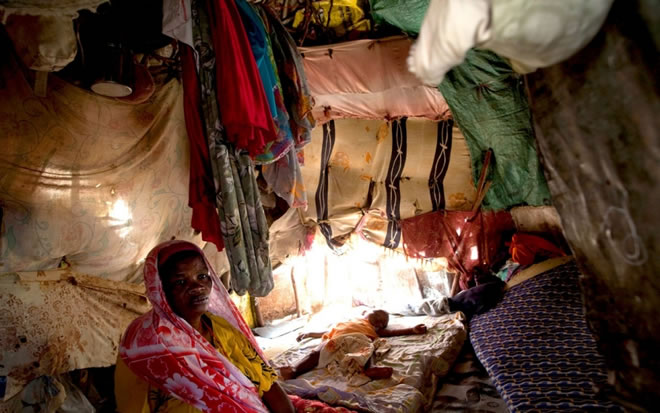
Ralia Abderraman, 45, who has 16 children and is pregnant again, rests in her tent at the Sayidka internally displaced persons' camp in Mogadishu, on Feb. 12, 2014.Jm Lopez/AFP/Getty Images

Thursday, February 20, 2014
A report published by Amnesty International on Wednesday said widespread intimidation, abuse of human rights and the withdrawal of services are forcing Somali refugees out of Kenya. A day earlier, Human Rights Watch (HRW) said Saudi Arabia has deported over 12,000 Somali migrants and refugees to their home country without allowing them to claim asylum.
Returning migrants and refugees face serious harm and threats to their freedom when they return to Somalia, the groups said. HRW condemned Saudi Arabia for not allowing anyone who fears ill-treatment at home to claim refugee status.
The U.N. said in a press release Tuesday that an estimated 857,000 Somalis face crisis-level food insecurity. The U.N. estimates that an additional 2 million Somalis are food insecure and another 1 million internally displaced with a million refugees in neighboring countries.
John Ging, director of the Coordination and Response Division at the U.N.'s Office for the Coordination of Humanitarian Affairs (OCHA) said at a news conference in New York on Tuesday that the situation in Somalia was “very ominous.”
“Somalis have suffered endlessly for almost 25 years,” Ging said.
Amnesty International’s report, “No Place Like Home,” highlighted the increasing difficulties Somalis face in Kenya after a string of attacks by the Somalia-based armed group Al-Shabab rocked the country.
Somalis are denied the opportunity to register their presence with the Kenyan government — forcing them to stay illegally in the country — and are actively targeted by authorities and face indiscriminate arrests, the report said.
Last November, in the wake of the Al-Shabab attack on Westgate Mall in Nairobi, the governments of Somalia and Kenya met with the United Nations High Commissioner for Refugees (UNHCR) and agreed on a framework for sending hundreds of thousands of refugees back to Somalia. The program is expected to start soon.
“The combination of insecurity and harassment has left refugees struggling to survive in Kenya. They are effectively being pushed out of their safe havens. For returns to be legal, they must be voluntary. That means without undue pressure, with their safety and dignity guaranteed,” said Sarah Jackson, deputy regional director at Amnesty International.
Jackson added: "The Kenyan government and UNHCR are duty bound to protect refugees in Kenya. Pressuring people to return to areas of active armed conflict where their lives and freedom are at risk is prohibited under international law.”
'Life-threatening situation'
Meanwhile in Saudi Arabia, authorities recently detained and then deported more than 12,000 Somali migrants, HRW said.
The deportations are part of a country-wide campaign to remove undocumented foreign workers after decades of lax immigration enforcement which allowed migrants to take many low-wage jobs the kingdom’s own citizens shunned.
Now grappling with high unemployment, Saudi Arabia wants the jobs free for its own citizens.
"The Saudi government is entitled to promote employment opportunities for its own citizens, but it needs to make sure it's not sending people back to a life-threatening situation," Gerry Simpson, senior refugee researcher at HRW, said. "Saudi Arabia has no excuse for not offering protection to some of the world's most vulnerable people."
The International Organization for Migration says the Somali government expects Saudi Arabia to deport another 30,000 people in the coming weeks. The U.N. refugee agency said Saudi authorities have denied its staff access to detained Somalis in the kingdom.
A woman in her ninth month of pregnancy told HRW in Mogadishu that she was detained in Saudi Arabia and separated from her husband. She said a Saudi policewoman beat her on the back with a baton while she stood in line at the airport. She went into labor and gave birth on the cabin floor of the plane as it flew to Mogadishu, the rights organization said.
The rights group said others described severe overcrowding, lack of access to fresh air and daylight, sweltering heat and limited medical assistance in Saudi detention centers. With one exception, none of the detention centers had bedding and detainees slept on the floor, Human Rights Watch said.
Dozens of children were also left unattended in difficult conditions where people fought over food.
Saudi Arabia's Interior Ministry spokesman could not be immediately reached for comment.